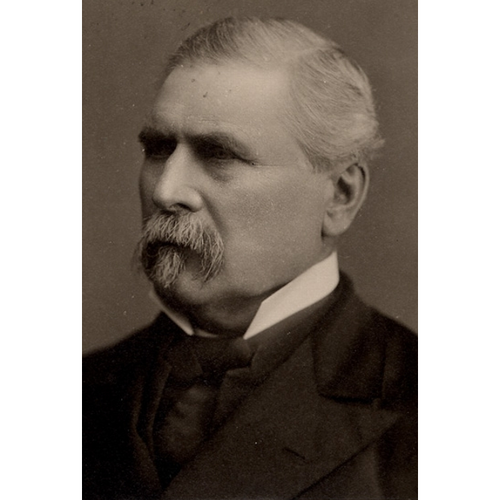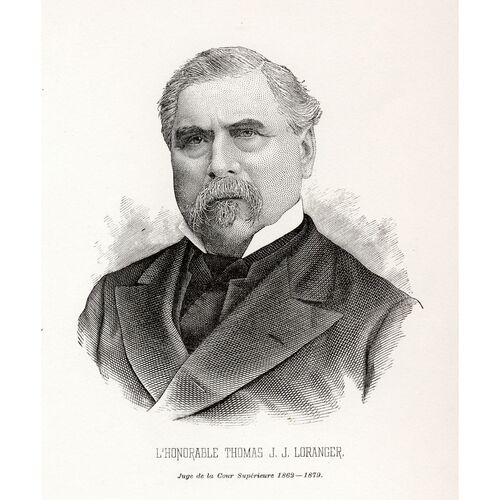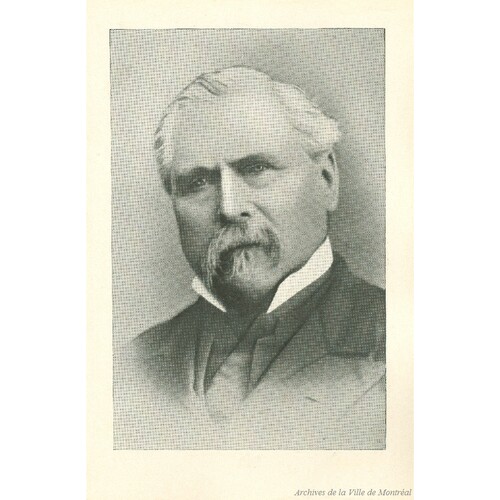LORANGER, THOMAS-JEAN-JACQUES, politician, judge, and writer; b. 2 Feb. 1823 at Yamachiche, Lower Canada, son of Joseph Rivard, dit Loranger, a farmer and later an innkeeper, and Marie-Louise Dugal; d. 18 Aug. 1885 at Sainte-Pétronille, Île d’Orléans, Que.
Thomas-Jean-Jacques Loranger, the eldest of 13 children, received a classical education at the Séminaire de Nicolet where he was a brilliant student. In 1842 he became a law student in the office of Antoine Polette in Trois-Rivières, and was called to the bar on 22 April 1844. After practising on his own at Trois-Rivières for some years, he went into partnership with Pierre-Richard Lafrenaye, a fellow student in Nicolet, and finally entered the Montreal office of Lewis Thomas Drummond, who was then attorney general of Canada East. In 1853 he formed a law partnership with François-Pierre Pominville, and in 1858 Loranger and his two brothers, Louis-Onésime, who would later become a judge, and Jean-Marie, opened their own law office.
Thomas-Jean-Jacques Loranger had an active legal career. He took a notable part in the legal discussions relating to the abolition of the seigneurial régime. As one of the attorney general’s deputies to the Seigneurial Court, he presented a long report, Mémoire composé de la plaidoirie de T. J. J. Loranger, which was published in 1855 and completed the next year by Suite du mémoire de M. Loranger. He maintained that the French feudal system had not been introduced into Canada in its entirety, and that in particular the seigneurs had obtained land grants only on condition they make sub-grants. In order to encourage settlement, the cens and rentes had been fixed at a very low rate, since their “maximum was not to exceed two sous per arpent”; as a result they had limited capital value at the time of the abolition of the seigneurial system. The court accepted the main lines of his argument. On 18 Dec. 1854 he was appointed a qc.
On 10 Aug. 1854 he had been elected as a Reformer to represent Laprairie in the Legislative Assembly. Re-elected in 1857, he became provincial secretary for Canada East in the government of John A. Macdonald* and George-Étienne Cartier*. During the 1858 session, in an important debate on a motion relating to the double majority, he declared that “any attempt at legislation affecting one section of the province, against the wishes of the majority of the representatives of that section, would be fraught with dangerous consequences for the well-being of the province, and would give rise to many injustices.” Yet, according to Louis-Philippe Turcotte*, Loranger “was of the opinion that the question of the double majority must not be raised. How could the majority from Lower Canada act in concert with that from Upper Canada, when the latter wanted mixed [nondenominational] schools and increased representation? To admit the principle that a majority in [each of] the two sections was required on general questions would be to run the risk of very frequent changes of government. A small majority would then prevail over a large one; and in the present situation, when the government is in the minority by three votes in Upper Canada and is supported by virtually all the members from Lower Canada, it would be an insignificant minority that would override the large total majority.”
During the same session, Loranger was among those who opposed Cartier’s choice of Ottawa as the capital and expressed a preference for Montreal. He voted against Cartier; the government resigned, and thus Loranger ceased to be a minister on 1 Aug. 1858. The Macdonald–Cartier government was replaced by that of George Brown* and Antoine-Aimé Dorion* which, however, lasted only 48 hours. The Conservatives returned to power and in the “double shuffle” [see George-Étienne Cartier] that then occurred Cartier did not offer Loranger a cabinet post. According to Laurent-Olivier David*, this was the beginning of an estrangement between the two men. As an illustration, when a bill relating to registry offices was under discussion on 16 May 1860, Loranger accused Cartier of wanting to anglicize his compatriots. Cartier got angry and asked Loranger if he knew how he had had to work and to struggle against certain prejudices to carry through a host of measures favourable to French Canadians. In 1862 Loranger helped defeat the Conservatives on the militia bill, and the government of John Sandfield Macdonald* and Louis-Victor Sicotte took office. Loranger remained an mla until he was appointed a Superior Court judge on 9 March 1863.
As a judge, Loranger sat successively at Beauharnois, Saint-Jean, and Sorel; he was often called to the Court of Appeal as an ad hoc judge as well. He retired in 1879 and became professor of administrative law at the Montreal branch of Université Laval.
In 1873 Loranger had published the first volume of his Commentaire sur le Code civil du Bas-Canada. A publisher’s note announced that the work would eventually consist of a large number of volumes, and would be “a complete treatise, much more complete than any book of this type previously published in Canada, on all the subjects in this code, as well as on all the subjects connected with it.” In his preface the author stressed the theoretical and practical nature of the work he was undertaking. But he was unable to finish the project. In the first volume he could only cover the first 114 articles of the code, ending with curatorship. In the second volume, published in 1879, he dealt solely with marriage. The author used his foreword to state his deep personal conviction that canon law and civil law recognize marriage “as a religious and sacramental act and as a civil contract,” and that “the church alone has jurisdiction over the marriage tie and the impediments to its validity, and that the state alone has authority over its civil aspects.” Loranger’s incomplete treatise has now been superseded, but at the time its publication was an important event in legal circles in Quebec.
In 1879 Loranger and a number of Montreal jurists started a legal journal, La Thémis, which was published monthly until December 1884. The journal contained articles on various subjects, and in particular carried sections continuing Loranger’s Commentaire sur le Code civil du Bas-Canada and others completing La bibliothèque du Code civil by Charles Chamilly de Lorimier. In 1869–72 Loranger also contributed to La Revue légale (Montreal and Sorel, Que.), which had just been started.
In addition, Loranger’s Lettres sur l’interprétation de la constitution fédérale, published in two volumes in 1883 and 1884, made him one of the first French Canadians to publish in the field of constitutional law. In this work he formulated the theory of a federative pact, which would later be taken up by several authors, particularly from Quebec. He thus became one of the great defenders of provincial autonomy. “The confederation of the British Provinces,” he wrote, “was the result of a compact entered into by the provinces and the Imperial Parliament, which, in enacting the British North America Act, simply ratified it.” Further on, he added: “In the reciprocal sphere of their authority, there exists no superiority in favour of Parliament over the provinces, but, subject to Imperial sovereignty, these provinces are quasi-sovereign within their respective spheres, and there is absolute equality between them.”
In 1876 the Quebec legislature had passed an act calling for the codification of the province’s general statutes. For this task, four commissioners were appointed on 16 Aug. 1877, with Judge Loranger as chairman. The commission set to work immediately and on 15 Feb. 1878 presented an initial report to the government describing what it had accomplished to date. However, at the beginning of March Charles-Eugène Boucher* de Boucherville was dismissed from office by Lieutenant Governor Luc Letellier de Saint-Just, Henri-Gustave Joly* came to power, and as a result the commission was set aside. According to Loranger this suspension was “a regrettable fact from all points of view.” In 1880, by virtue of a new act, the work of codification was resumed under the sole direction of Loranger, and in 1881 he presented the Report of the commission appointed to revise and consolidate the statutes of the province of Quebec. In it he outlined his ideas on the nature of Canadian federalism, as well as a plan of codification. Loranger proposed the creation of a permanent commission “whose functions would be to ensure consistency in the statutory laws and to protect the code of the statutes from the incoherence and confusion of new laws.” In 1882 the Judicial reforms proposed by the commission for the codification of the statutes was published with a foreword by Loranger. But he was unable to complete his work, for he died on 18 Aug. 1885 at Sainte-Pétronille on the Île d’Orléans, where he was spending the summer with his family.
On 17 Dec. 1859 Loranger had been appointed to the first Council of Public Instruction. He had been president of the Association Saint-Jean-Baptiste de Montréal in 1880 and 1884, and thus had presided at the great celebrations in Montreal marking the 50th anniversary of the association. He was also among those who took the initial steps to have the Monument National raised, and he presided at the laying of the corner-stone. His funeral was held on 21 August in Notre-Dame, Montreal, with all the pomp called for by the death in office of a president of the Association Saint-Jean-Baptiste, an event which the newspapers stressed had not occurred since the death of Ludger Duvernay* in 1852. The burial took place at the Côte-des-Neiges cemetery. Loranger was a commander of the order of Saint-Grégoire-le-Grand.
On 13 May 1850, in Montreal, Loranger had married Sarah-Angélique Truteau, the niece of vicar general Alexis-Frédéric Truteau*, and they had one child. His wife died in 1858 and on 6 July 1864, at Quebec, he married Zélie-Angélique Borne, granddaughter of Philippe-Joseph Aubert* de Gaspé, and they had seven children. Laurent-Olivier David described Loranger as “one of the most scholarly, eloquent and witty men of his time, with a mind quintessentially French, serious in nature and lively, sparkling, and graceful in expression: a star of the first magnitude in the Pleiad of talents that shone with such brilliance from 1848 to 1867.”
[The major works of Thomas-Jean-Jacques Loranger are: Mémoire composé de la plaidoirie de T. J. J. Loranger, c.r., un des substituts du procureur-général, devant la Cour seigneuriale (Montréal, 1855); Suite du mémoire de M. Loranger contenant sa réplique devant la Cour seigneuriale (Montréal, 1856); Commentaire sur le Code civil du Bas-Canada, A. E. Brassard, édit. (2v., Montréal, 1873–79). As president of the commission he published the Qué., Royal Commission, First report of the commissioners appointed to classify, revise and consolidate the general statutes of the province of Quebec (Quebec, 1878); Report of the commission appointed to revise and consolidate the statutes of the province of Quebec . . . (Quebec, 1881); and Judicial reforms proposed by the commission for the codification of the statutes: first report (Quebec, 1882). The last two works were also issued in French. In addition, he wrote Lettres sur l’interprétation de la constitution fédérale, dite l’Acte de l’Amérique britannique du Nord, 1867 (2v., Québec, 1883–84), which was translated into English and published under the title of Letters upon the interpretation of the federal constitution known as the British North America Act (1867) (2v., Quebec, 1884). For a fuller description of Loranger’s works and of articles about him in various periodicals, the reader should consult Ursule Loranger, “Bio-bibliographie de l’honorable juge Thomas-Jean-Jacques Loranger . . .” (a paper presented to the École de bibliothéconomie de l’univ. de Montréal, 1943). j.-c.b.]
AC, Montréal, État civil, Catholiques, Notre-Dame de Montréal, 21 août 1885. L’Événement, 18 août 1885. Gazette (Montreal), 19–22 Aug. 1885. La Minerve, 19 août 1885. Le Monde illustré (Montréal), 29 août 1885. Montreal Herald and Daily Commercial Gazette, 19 Aug. 1885. La Presse, 20 août 1885. Beaulieu et J. Hamelin, La presse québécoise, II. Charles Chamilly de Lorimier, La bibliothèque du Code civil de la province de Québec (21v., Montréal, 1871–90). L.-O. David, Tribuns et avocats . . . (Montréal, 1926). Dominion annual register, 1885: 267. P.-G. Roy, Les juges de la prov. de Québec, 507. L.-O. David, Mes contemporains (Montréal, 1894), 255–60; Souvenirs et biographies (Montréal, 1911), 60–66. É.-Z. Massicotte, Processions de la Saint-Jean-Baptiste en 1924 et 1925; accompagnées de biographies et portraits des présidents généraux de la Société Saint-Jean-Baptiste de Montréal . . . (1834–1926) (Montréal, 1926). L.-P. Turcotte, Le Canada sous l’ Union, II: 344–45.
Cite This Article
Jean-Charles Bonenfant, “LORANGER, THOMAS-JEAN-JACQUES,” in Dictionary of Canadian Biography, vol. 11, University of Toronto/Université Laval, 2003–, accessed April 29, 2025, https://www.biographi.ca/en/bio/loranger_thomas_jean_jacques_11E.html.
The citation above shows the format for footnotes and endnotes according to the Chicago manual of style (16th edition). Information to be used in other citation formats:
| Permalink: | https://www.biographi.ca/en/bio/loranger_thomas_jean_jacques_11E.html |
| Author of Article: | Jean-Charles Bonenfant |
| Title of Article: | LORANGER, THOMAS-JEAN-JACQUES |
| Publication Name: | Dictionary of Canadian Biography, vol. 11 |
| Publisher: | University of Toronto/Université Laval |
| Year of revision: | 1982 |
| Access Date: | April 29, 2025 |


![L'Honorable Thomas J. J. Loranger. Juge de la cour supérieure 1862- 1879 [image fixe] Original title: L'Honorable Thomas J. J. Loranger. Juge de la cour supérieure 1862- 1879 [image fixe]](/bioimages/w600.4840.jpg)



